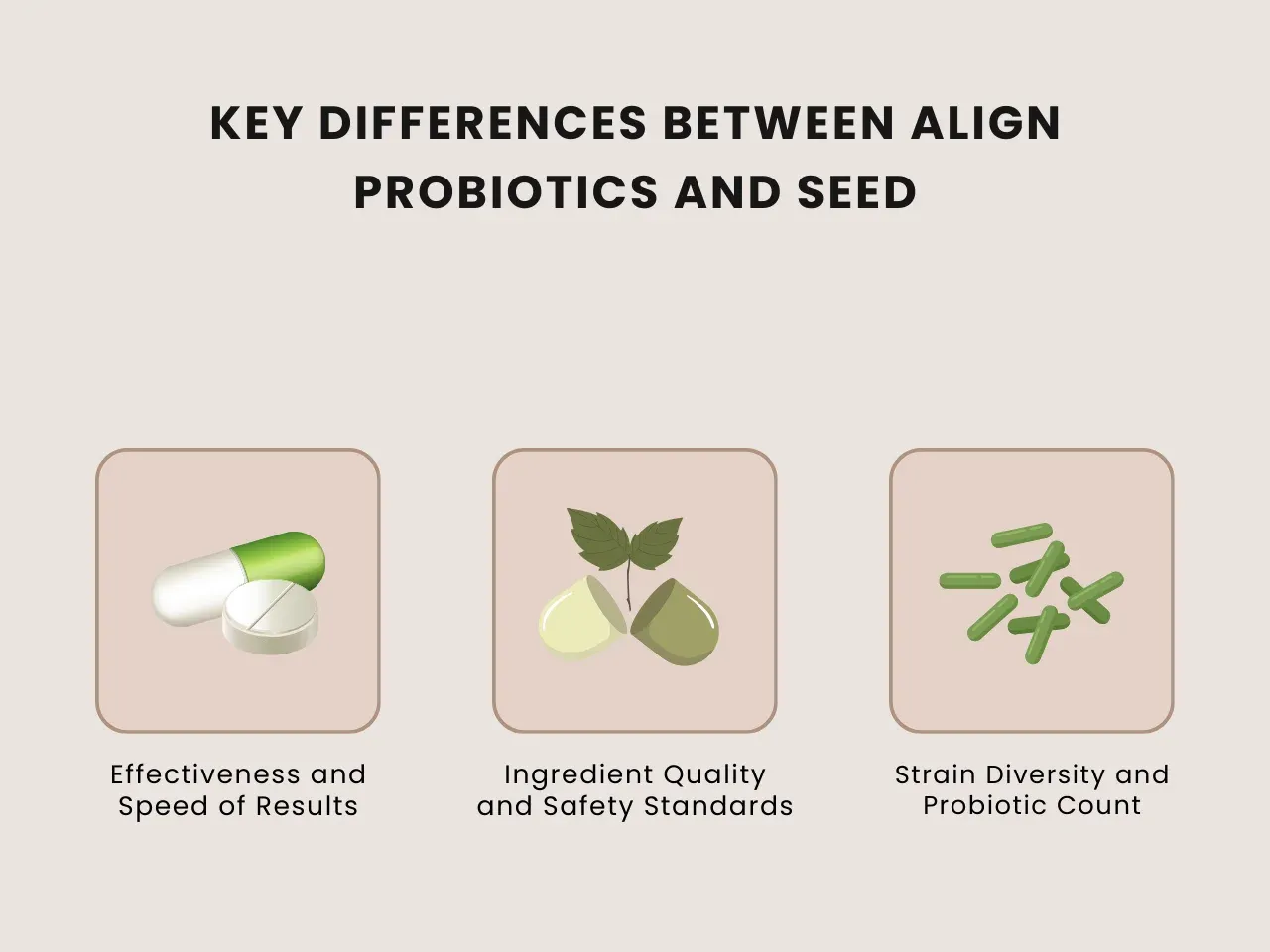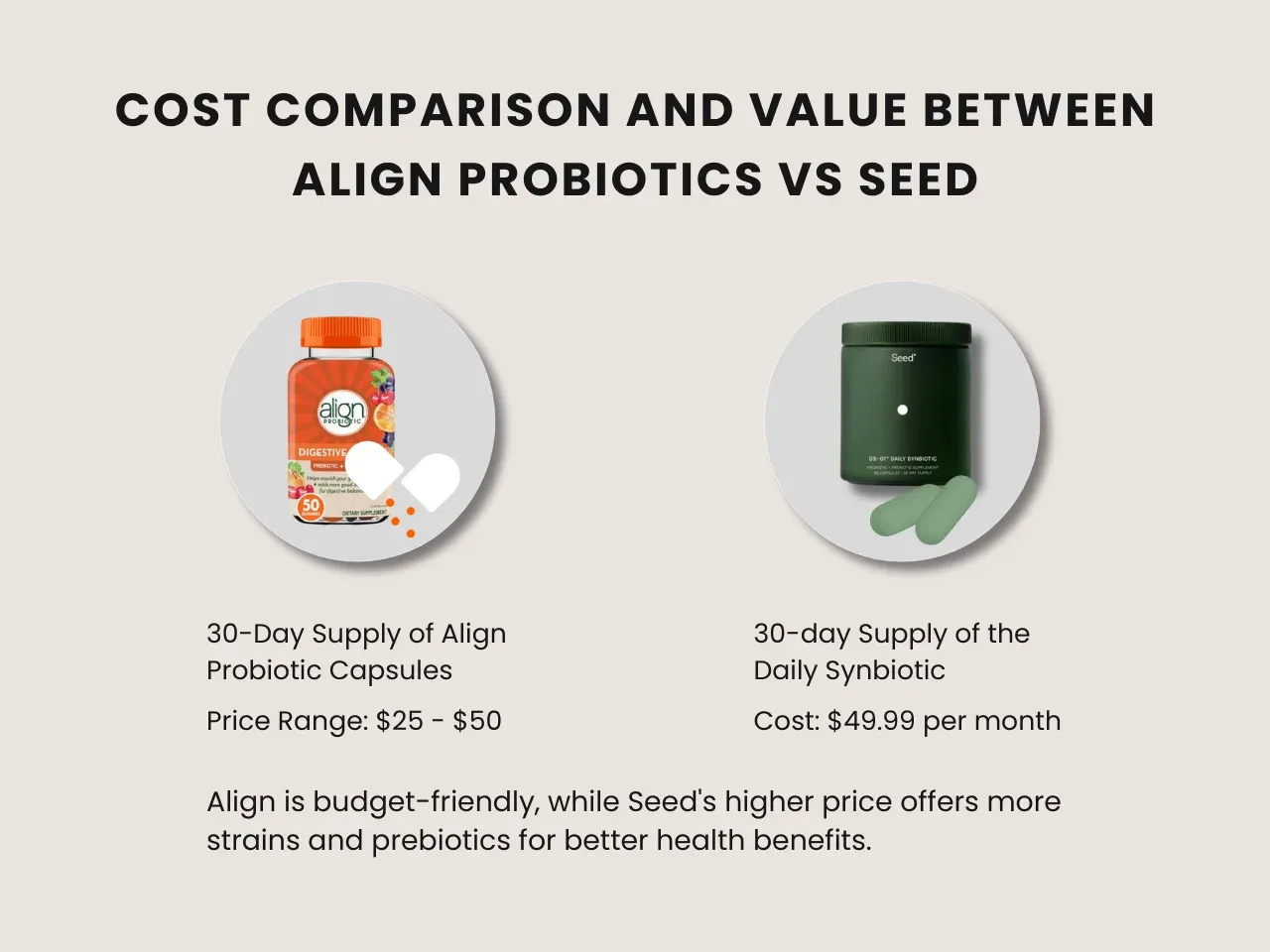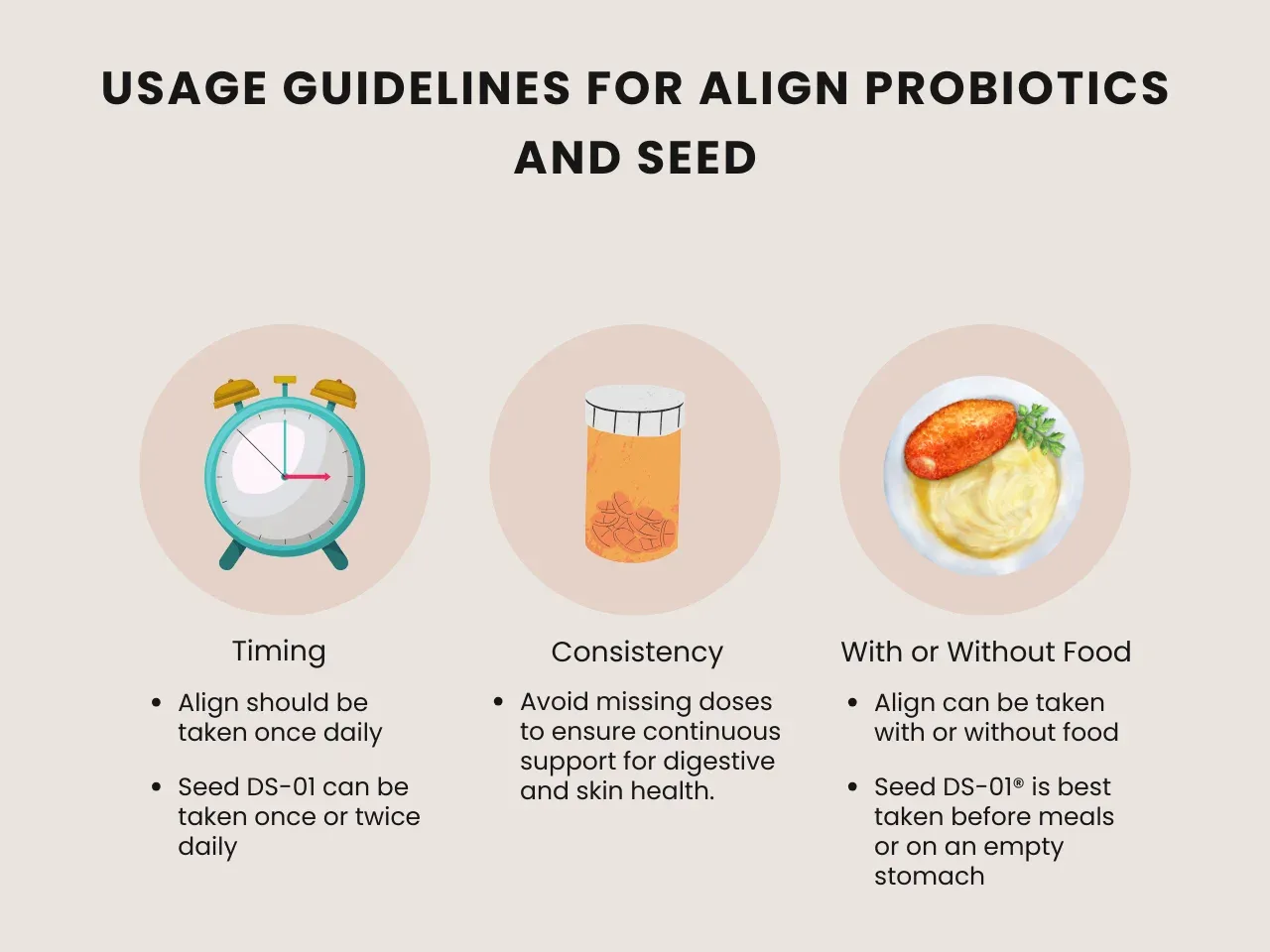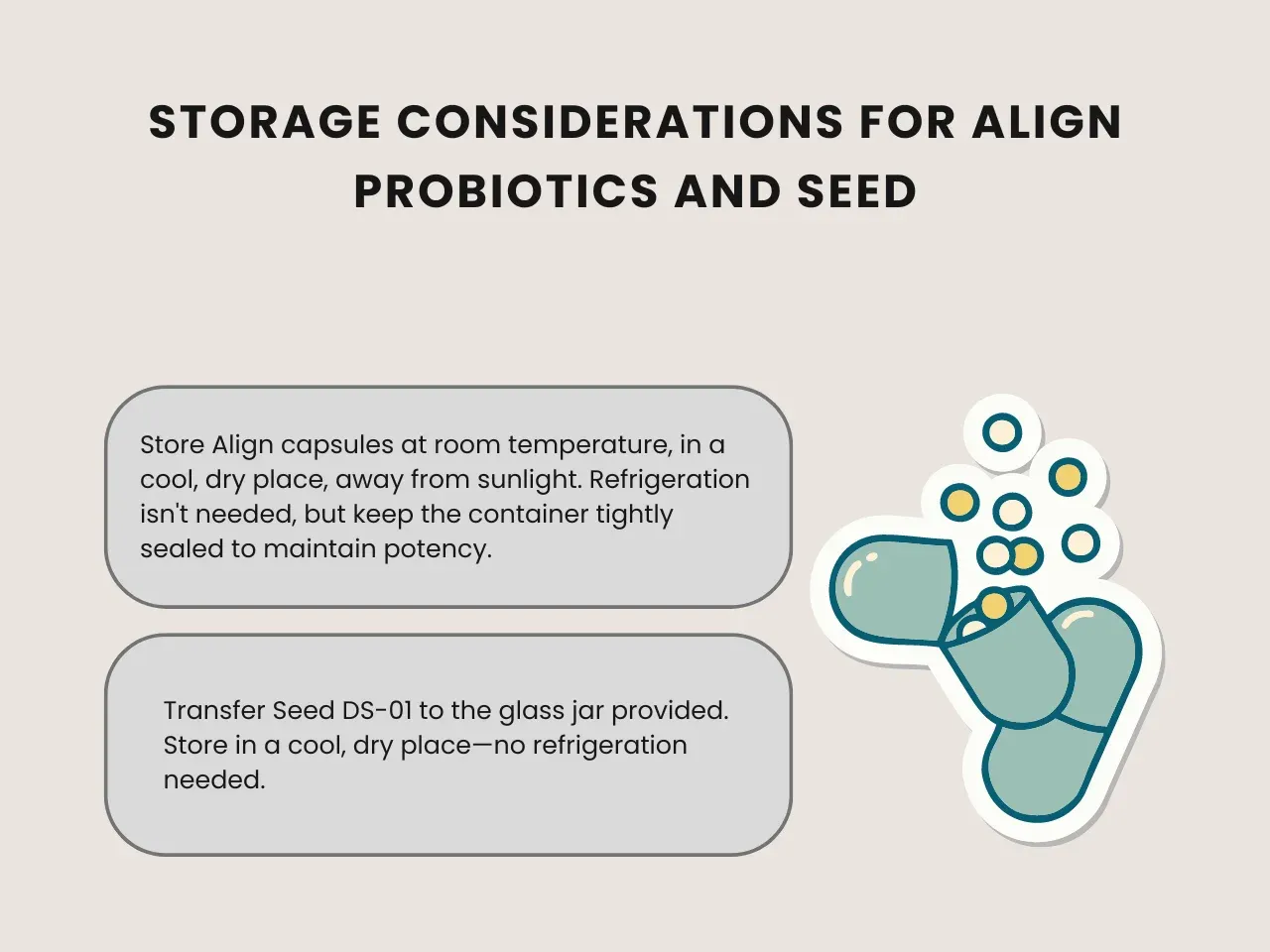Align Probiotics vs Seed: Which One Should You Choose?
Choose between Align probiotics vs Seed probiotics for optimal gut health. Find out which one is right for you on our blog!

Deciding between Align Probiotics vs Seed can have a substantial impact on your gut health and overall well-being. Both come in different formulations with different benefits, which may affect your gut health and the value you get from the investment. Knowing the differences between Seed and Align in terms of their effectiveness, ingredient quality, and cost will help you determine the ideal probiotic supplement for your needs.
At Nudge, we provide clear insights into Align Probiotics vs Seed, helping you make an informed choice by comparing their unique features. Our expertise extends to our health supplement, which addresses the three leading root causes of SIBO using prokinetics to promote optimal digestive function.
Based on our extensive research, we’ve curated this guide to help you determine the best choice in Align Probiotics vs Seed for your health objectives. We’ll discuss their cost structures, value for money, and probable side effects, enabling you to make a well-informed decision. By the end, you'll understand how each probiotic may impact your health on a daily basis by examining its effectiveness, cost, and potential side effects.
Let's begin!
Align Probiotics vs Seed: What’s the Difference?
Align Probiotics and Seed are top brands, each offering unique benefits. When choosing any probiotic supplement, one must consider important points such as effectiveness, ingredient quality standards, and strain diversity. Discover how we compare these two products to help you make an informed decision:

Effectiveness and Speed of Results
Align and Seed have particular probiotic strains that can survive stomach acid and reach the gut. Align Probiotics is specifically formulated to promote digestive health, particularly for individuals with irritable bowel syndrome (IBS). Its primary strain, Bifidobacterium longum 35624, has been clinically studied and shown to alleviate symptoms such as bloating, abdominal discomfort, and irregular bowel movements.
Meanwhile, Seed's Daily Synbiotic contains 24 strains evaluated in clinical trials and scientific studies, providing a broad-spectrum approach to gut health. It may take longer to see results because these strains need time to settle in the gut microbiome. However, many users notice improvements such as regular bowel movements, clearer skin, and enhanced immunity within three days of use.
Ingredient Quality and Safety Standards
Align focuses on digestive health with its exclusive strain, Bifidobacterium longum 35624. The product is free from allergens like gluten, soy, and dairy, making it suitable for individuals with specific dietary restrictions. However, Align must provide comprehensive information regarding sourcing its ingredients or additional certifications beyond its gluten-free status.
Seed cares deeply about how it sources and tests its ingredients. Its "daily synbiotic" includes prebiotics from Indian pomegranate, chosen for its ability to nourish the good bacteria the probiotic strains provide. Furthermore, Seed uses sustainable packaging, including a refillable glass jar and compostable materials.
Strain Diversity and Probiotic Count
Align Probiotics contains a single strain, Bifidobacterium longum 35624, selected for its proven efficacy in supporting digestive health, particularly in those with IBS. Each capsule provides about 1 billion CFUs, contributing to targeted digestive issues and maintaining regularity. While effective for targeted digestive problems, it may not offer as wide a range of benefits as multi-strain probiotics.
Seed’s DS-01 Daily Synbiotic features a diverse array of 24 probiotic strains, including various Lactobacillus and Bifidobacterium species. This diversity aims to offer comprehensive support for multiple aspects of health, including digestion, skin, and immune function. Seed provides a high probiotic count of 53.6 billion AFU (Active Fluorescent Units) per dose, highlighting its broad-spectrum support to overall health.
Cost Comparison and Value for Money
Align Probiotics and Seed offer different pricing models and benefits, which can influence your choice based on your needs and budget. Check out this detailed comparison of their prices, subscription options, and the value they provide.

Pricing Structure of Align Probiotics
Align offers a variety of probiotic products catering to different needs and preferences. The most common options include a 30-day supply of Align Probiotic capsules and larger, multi-month packages. Typical retail prices for Align products range from approximately $25 to $50, depending on the size and formulation.
Align Probiotics frequently runs discounts and promotions, such as coupons or bulk purchase deals, which can reduce the overall cost. When considering the cost per serving, Align's pricing translates to about $0.83 to $1.67 per day, making it relatively affordable compared to other premium probiotic options.
Seed Probiotics Pricing and Subscription Options
Seed mainly operates on a monthly subscription model. Upon subscribing, customers receive a welcome kit containing a reusable glass jar for storage and a 30-day supply of the daily synbiotic. The monthly subscription costs $49.99 and includes free shipping.
Seed offers a first-time customer discount and significant cost savings through its subscription model compared to one-time purchases. Subscribers also benefit from lower prices on subsequent orders and additional perks. Seed’s customer service includes a 30-day satisfaction guarantee, allowing users to request refunds if they are unsatisfied with the product.
Cost vs. Benefits Analysis
Both products offer distinct advantages in terms of cost versus benefits. Align's lower cost per serving makes it a more budget-friendly option, ideal for consumers who prioritize affordability. However, Seed's higher price point includes additional benefits, such as more probiotic strains and prebiotics, which may offer superior digestive and overall health improvements.
Seed's subscription model further enhances value by providing long-term cost savings and additional features like a travel container. Seed may offer better long-term value despite its higher initial cost for individuals seeking the highest quality and comprehensive benefits. Conversely, Align Probiotics remains a cost-effective choice for budget-conscious people seeking proven benefits.
Side Effects and Considerations
When selecting a probiotic supplement, it's essential to be aware of potential side effects and special considerations to ensure optimal use and safety. Here, we examine Align and Seed probiotics' side effects and usage guidelines.
Known Side Effects of Align Probiotics
When introducing Align Probiotics into your routine, you must be aware of potential side effects, especially during the initial use phase. Most side effects are mild and tend to subside as the body adjusts to the new probiotic strains. Some individuals may experience mild gastrointestinal symptoms such as:

- Bloating: A common initial reaction as the gut flora adjusts.
- Gas: This may occur due to the probiotic strains interacting with the digestive system.
- Diarrhea: Occasionally reported, especially when first starting the supplement, as the balance of gut bacteria shifts.
For specific populations, like pregnant women, Align Probiotics is generally not known to pose significant risks, but it's best to consult a healthcare provider before starting any supplement during pregnancy. Likewise, individuals with chronic gastrointestinal issues or weakened immune systems should consult their doctor to discuss incorporating probiotics into a healthy diet and nutrition plan.
Guidelines for Mitigating Side Effects
- Start with a Low Dosage: If you are new to probiotics, begin with a lower dosage to allow your digestive system to adjust. This can help reduce the likelihood of experiencing gastrointestinal discomfort, such as bloating or gas.
- Consistency in Timing: Take Align Probiotics at the same time each day to enhance the supplement's effectiveness and help your digestive system adapt more smoothly.
- Avoid Heavy Meals: Taking Align Probiotics on an empty stomach or with a light meal can help reduce the risk of gastrointestinal issues. Following a low FODMAP diet, which minimizes high-fermentation foods, may also help alleviate potential side effects.
- Gradual Adjustment: If you experience mild digestive discomfort, consider reducing the dosage temporarily and gradually increasing it as your body adjusts. This step-by-step approach can ease the transition.
- Stay Hydrated: Adequate hydration throughout the day supports overall digestive health and can help alleviate mild gastrointestinal symptoms associated with probiotic use.
- Consult with a Healthcare Provider: If you experience persistent or severe side effects, have underlying health conditions, or notice significant changes in your cholesterol levels, consult a healthcare provider.
Potential Drawbacks of Seed Probiotics
When beginning Seed DS-01 Daily Synbiotic, some users might experience mild side effects as their digestive system adjusts to the new probiotic strains. These symptoms are generally temporary and should subside within one to two weeks as the body acclimates to the probiotics. Common side effects based on Seed probiotic reviews include:

- Mild Nausea: Some individuals might feel slight nausea as their body adapts. This is generally a normal part of the adjustment period.
- Gastrointestinal Discomfort: During the initial days of use, this may manifest as bloating or abdominal tightness. Such discomfort often indicates that the digestive system is adjusting to the new probiotics.
- Changes in Stool: Variations in stool consistency or frequency can occur, including increased frequency of bowel movements or, less commonly, constipation, as the gut flora adjusts. These changes can impact colon function as the digestive system adapts to the new probiotic strains.
Seed probiotics review and clinical studies highlight a few concerns, though they are generally minor. Some users have reported experiencing changes in bowel habits, including increased frequency of bowel movements. While these reports are standard, they underline the importance of monitoring individual responses to the supplement.
Guidelines for Mitigating Side Effects
- Gradual Introduction: Begin with a lower dosage, such as one capsule daily, to allow your digestive system and gut immune function to adjust. After a few days, gradually increase to the recommended dosage to help minimize gastrointestinal discomfort, such as bloating and gas.
- Consistent Timing: Take Seed DS-01 at the same time each day, preferably on an empty stomach, before breakfast or before bed. This consistency can aid in the effective absorption and utilization of the probiotic strains.
- Hydration: Ensure adequate hydration throughout the day. Drinking sufficient water can support digestion and help alleviate any mild gastrointestinal issues.
- Dietary Adjustments: Pay attention to your diet and avoid foods that may exacerbate digestive discomfort during the initial supplementation phase. Incorporating fiber-rich foods and avoiding heavy or spicy meals may help ease symptoms.
- Consultation with Healthcare Provider: If side effects persist or if you have underlying health conditions, consult a healthcare provider for personalized advice. They can help assess whether Seed DS-01 suits you and recommend adjustments or alternatives if necessary.
Usage Guidelines and Consumer Tips
Proper usage is critical to maximizing the benefits of Seed and Align probiotics. Both products require consistent timing and adherence to specific instructions for optimal effectiveness. Whether you're using a standard probiotic or a SIBO supplement, following these guidelines can enhance your digestive health effectively:

- Timing: Take probiotics like Align and Seed DS-01 Daily Synbiotic simultaneously for optimal results. Align should be taken once daily, ideally in the morning, with or without food. Seed DS-01 can be taken once or twice daily, preferably on an empty stomach. It is recommended to start with one capsule in the morning and increase to twice daily after 4-5 days.
- Consistency: Adhering to a regular schedule helps maintain the balance of beneficial bacteria in the gut, which is crucial for effectiveness. Avoid missing doses to ensure continuous support for digestive and skin health.
- With or Without Food: Align can be taken with or without food, while Seed DS-01® is best taken before meals or on an empty stomach to enhance absorption. Following specific product instructions helps maximize probiotics' benefits and accompanying digestive enzymes.
Storage Considerations

- Align Probiotics: Store Align capsules at room temperature in a cool, dry place away from direct sunlight. Refrigeration is unnecessary, but keeping the container tightly sealed helps maintain potency.
- Seed DS-01 Daily Synbiotic: Upon receipt, transfer Seed DS-01 from the compostable packet to the provided glass jar. It does not require refrigeration and should be stored in a cool, dry place to preserve the viability of the probiotics and prebiotics.
Avoid an abrupt switch when transitioning from one brand of probiotics to another. This way, your digestive system will have enough time to adjust to the new bacteria strains smoothly, reducing the risk of digestive problems. Consulting a healthcare provider is recommended if you combine probiotics with other supplements.
Key Takeaway
Improving gut health requires understanding the differences between Align Probiotics and Seed DS-01 Daily Synbiotic. Both contain active ingredients with unique benefits; thus, knowing what each one offers is essential to deciding which probiotic best suits your needs. Evaluating factors such as specific health concerns, desired outcomes, and the composition of each product can help you make an informed decision.
Align Probiotics address specific digestive issues, such as IBS, with strains showing symptom management related to the condition, including bloating and irregular bowel movements. In contrast, Seed DS-01 Daily Synbiotic combines probiotics and prebiotics to enhance overall gut health, skin clarity, and general well-being, making it more comprehensive for broader health benefits.
Need help deciding between Align Probiotics and Seed? Nudge can provide tailored guidance to help you make the best choice. We’ll help you choose the option that aligns with your goals for achieving ultimate digestive health. Try our free trial today and discover how Nudge can transform your health with our range of targeted supplements and personalized support.